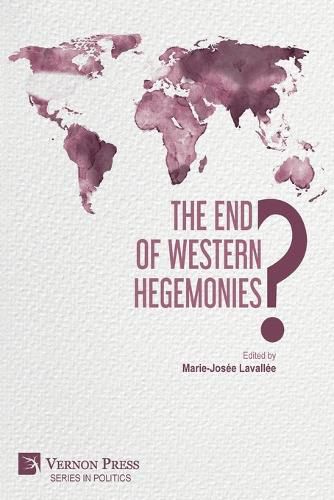Readings Newsletter
Become a Readings Member to make your shopping experience even easier.
Sign in or sign up for free!
You’re not far away from qualifying for FREE standard shipping within Australia
You’ve qualified for FREE standard shipping within Australia
The cart is loading…






This title is printed to order. This book may have been self-published. If so, we cannot guarantee the quality of the content. In the main most books will have gone through the editing process however some may not. We therefore suggest that you be aware of this before ordering this book. If in doubt check either the author or publisher’s details as we are unable to accept any returns unless they are faulty. Please contact us if you have any questions.
In the face of recent trends like growing authoritarianism and xenophobic nationalism, the rise of the Far Right, the explosion of economic and social inequalities, heightened geopolitical contest and global capitalism's endless crisis, and the impacts of shocks like the Covid-19 pandemic, discourses about the 'decline of the West' no more look like mere ruminations of a handful of cultural depressives and politically disillusioned; they sound increasingly realistic.
This volume addresses this issue by mapping and analyzing the forms, mechanisms, strategies, and effects, in the past, the present, and the future, of Western hegemonies, namely, asymmetrical relations that bring advantages or, at least, secure the superiority of Western state and non-state actors in politics, economics, and culture broadly understood. Over the past decades and centuries, Westerners never ceased claiming supremacy in all these spheres. A host of these relations were initiated through colonialism and imperialism, and perpetuated through informal imperialism, but there are other channels: political interference, inequalities between countries, and attempts at affirming the supremacy of the so-called Western way of life was also secured through the military might and economic power of great Western actors.
This book explores sites of Western hegemonies and contributes to understanding the mechanisms through which international hierarchies are formed and maintained. Bringing together the research of scholars from various fields in the humanities and social sciences, political science, international relations, political philosophy, sociology, history, postcolonial studies, criminology, and linguistics, this volume develops a multidisciplinary outlook on the issue of Western hegemonies that allows uncovering resemblances between various forms of asymmetrical relations and their mechanisms.
$9.00 standard shipping within Australia
FREE standard shipping within Australia for orders over $100.00
Express & International shipping calculated at checkout
This title is printed to order. This book may have been self-published. If so, we cannot guarantee the quality of the content. In the main most books will have gone through the editing process however some may not. We therefore suggest that you be aware of this before ordering this book. If in doubt check either the author or publisher’s details as we are unable to accept any returns unless they are faulty. Please contact us if you have any questions.
In the face of recent trends like growing authoritarianism and xenophobic nationalism, the rise of the Far Right, the explosion of economic and social inequalities, heightened geopolitical contest and global capitalism's endless crisis, and the impacts of shocks like the Covid-19 pandemic, discourses about the 'decline of the West' no more look like mere ruminations of a handful of cultural depressives and politically disillusioned; they sound increasingly realistic.
This volume addresses this issue by mapping and analyzing the forms, mechanisms, strategies, and effects, in the past, the present, and the future, of Western hegemonies, namely, asymmetrical relations that bring advantages or, at least, secure the superiority of Western state and non-state actors in politics, economics, and culture broadly understood. Over the past decades and centuries, Westerners never ceased claiming supremacy in all these spheres. A host of these relations were initiated through colonialism and imperialism, and perpetuated through informal imperialism, but there are other channels: political interference, inequalities between countries, and attempts at affirming the supremacy of the so-called Western way of life was also secured through the military might and economic power of great Western actors.
This book explores sites of Western hegemonies and contributes to understanding the mechanisms through which international hierarchies are formed and maintained. Bringing together the research of scholars from various fields in the humanities and social sciences, political science, international relations, political philosophy, sociology, history, postcolonial studies, criminology, and linguistics, this volume develops a multidisciplinary outlook on the issue of Western hegemonies that allows uncovering resemblances between various forms of asymmetrical relations and their mechanisms.